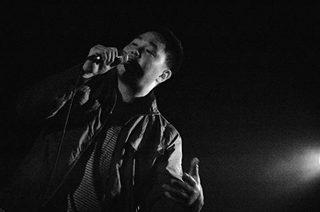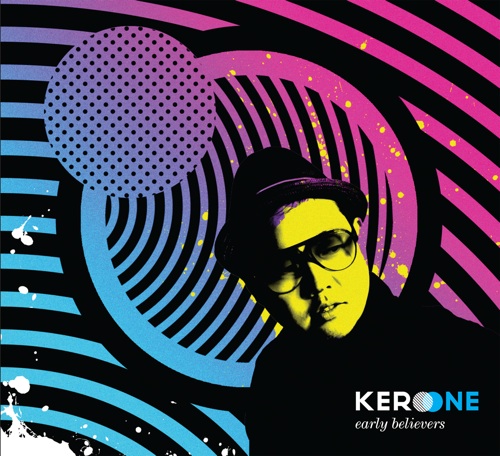Talent, a strong work ethic and a little bit of luck. Kero One can tell you that’s the true recipe for success. Kero’s first single, which was released in 2003, only had 50 copies distributed throughout the world, but one of those copies managed to land in the hands of a prominent Japanese DJ, launching Kero’s career into high gear before he even knew what hit him. In 2005 he released the critically acclaimed album Windmills of the Soul and earlier this year he hit listeners with his sophomore effort, “Early Believers“. Although he’s currently touring the world, Kero took a few minutes out of his busy schedule to sit down with us at RapReviews to talk about his music, the world’s Hip-Hop scenes, and the lack of Asians in American Hip-Hop.
Adam Bernard: Your career has been one giant DIY success story. Can you hit me with some of the thoughts you had when you recorded that first 12 inch in 2003? What were your goals for it and how surprised were you at the actual results?
Kero One: Being a DJ and obsessive record collector, having my own 12″ single was a dream come true. More so than a tape or a CD, I thought a 12″ was a Hip-Hop trophy. One of the other reasons I made the single was because at the time I started writing the tracks in 2000 I wasn’t feeling a lot of the Hip-Hop that was surfacing. I thought I could bring in a different element to the game, but I was still somewhat unsure because who was I in the world of Hip-Hop? An Asian kid without industry connections. I had a few obstacles to climb. However, from the release of the 12″ I was able to tour all throughout Japan, so it was a pretty amazing feat for me. I’m glad I did it.
AB: With you gaining a Japanese audience first and having that ability to tour internationally, tell me a little bit about which Hip-Hop scenes you’ve seen around the world and what aspects of each one would you like to incorporate into the American scene?
KO: Wow, the list is a bit large. Of course Japan, then Korea, Taiwan, Philippines, Europe, Australia. I was the most impressed with the Hip-Hop scene in Japan, especially in 2006. There was a huge community and an in-depth understanding of what’s available in Hip-Hop music. I learned about more new Hip-Hop acts from my own country in Japan than anywhere else. Also Poland was off the hook. They have a huge dance community which compliments the Hip-Hop scene. I never performed to crowds that live on my whole European trip.
AB: From what you’ve seen is America as receptive an audience to new music as the rest of the world?
KO: I think so. Just like everywhere else in the world, I think people float on trends, but I think the main difference is where the trend comes from. In some places that trend only comes from the mainstream outlets. In other places, such as Japan, the trends come from the underground communities and tastemakers. I think in the past America’s been more receptive to mainstream culture, but who knows what it’s like now with the internet and all.
AB: Recently you released your sophomore album, “Early Believers.” Sonically, what were you looking to do with this album and how did you go about accomplishing it?
KO: Sonically, I wanted to make it sound like it had depth, width, pop, but with analog warmth. I mixed the entire album myself with a mixture of digital and vintage analog gear and sent it off to one of the top mastering engineers at Universal Records to put the cherry on top.
AB: What part of the song creation process inspires you most?
KO: The chord structure, or the beat. Once I hear something dope I’ll get inspired with concepts and ideas for the song lyrics.

“The title of the album is obviously an homage to those who’ve been down from the start.”
AB: The title of the album is obviously an homage to those who’ve been down from the start. I will openly admit, being an east coaster I found out about you later. Will you be recording a follow up for folks like me titled Bandwagon Jumpers?
KO: Actually, this album title also is a call to listeners like yourself because though the album has gained popularity, it’s still underground in a lot of respects. I’d say you’re an early believer. Much love!
AB: Let’s go from believers to influences. Who were some of your earliest influences in music and in what ways did they influence you?
KO: They come from many different places. From early 90’s Hip-Hop like Gangstarr, Organized Konfusion and Nas for the production and lyricism all the way to real life experiences that have shaped my stories and lyrical content. In one of my songs called “In a Dream,” from my first album, Windmills of the Soul, I talk about how a good friend of mine got caught up in the drug game and started denying all the people he was close to including his parents, friends, and me.

“I’m just gonna do me and hope people enjoy the music I’m making.”
AB: You are in a very unique position being one of the few prominent Asians in American Hip-Hop right now. Do you feel any added responsibility because of this, like you’re some kind of ambassador?
KO: {laughs} No, but I think some people out there want me to be. It’s not easy for a lot of labels to work me as an artist because they don’t know how to market me despite the amount of Asian fans out there. I’m just gonna do me and hope people enjoy the music I’m making.
AB: Do you think we’ll ever see a huge Asian influx into the American Hip-Hop scene?
KO: I hope not. Just kidding. I think so. Especially as Hip-Hop develops in Asian countries and a new generation of Asian-Americans starts adopting Hip-Hop culture, there will be more. Some of the illest Hip-Hop production to me is coming out of Korea and Japan right now.
AB: Finally, since you just broached the subject of what you’re feelin, tell everyone who YOU think is dope?
KO: Man, so many. Nirvana, The Pharcyde, Roy Ayers, Kanye, Justice, and MAW.

